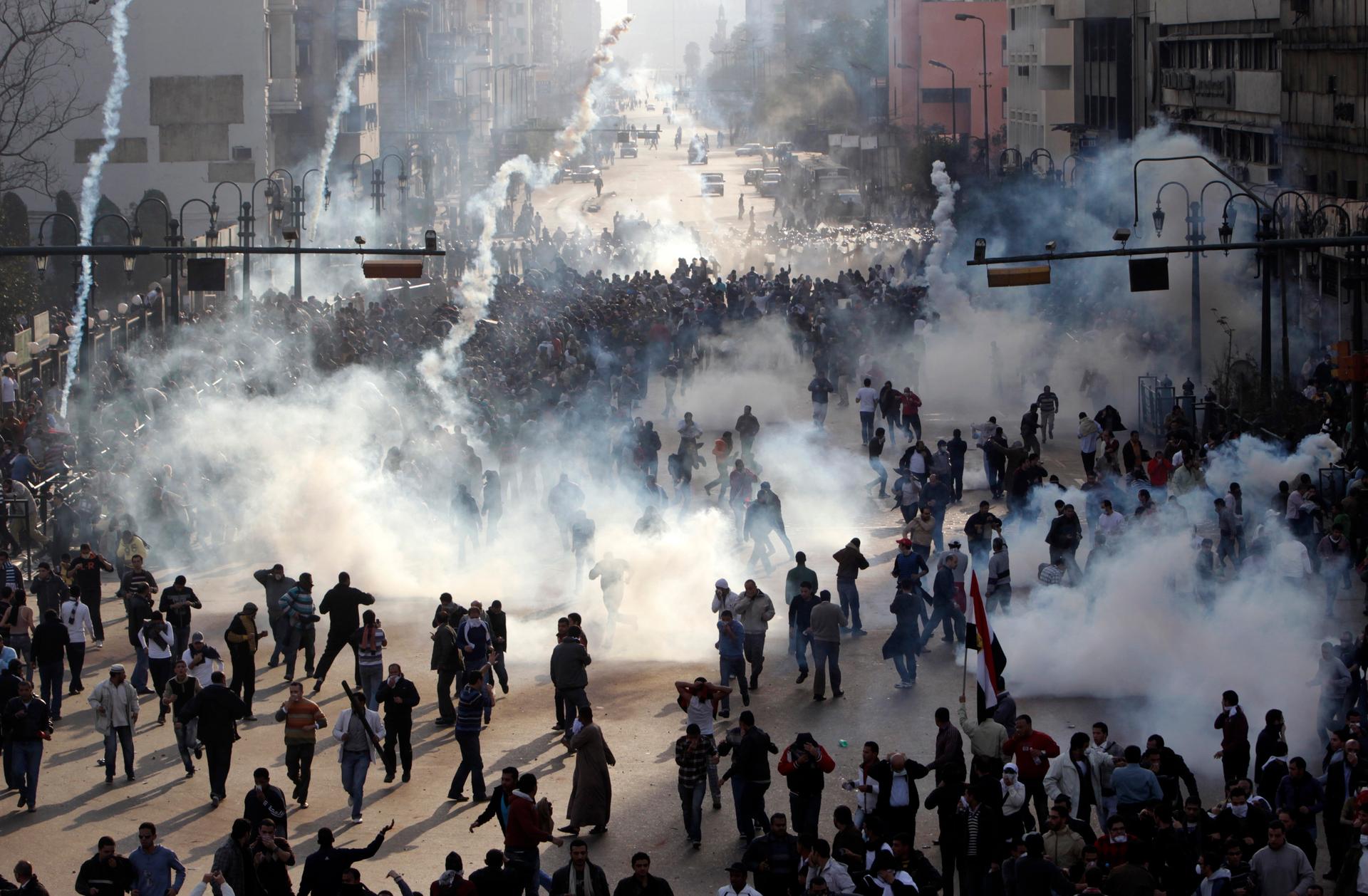More than five years after the Arab Spring protests, Egyptian protesters are still disappearing
Protesters flee from tear gas fire during clashes in Cairo January 28, 2011. Police and demonstrators fought running battles on the streets of Cairo in unprecedented protests by tens of thousands of Egyptians demanding an end to President Hosni Mubarak's three-decade rule.
Mona Eltahawy, an Egyptian author and New York Times opinion columnist, is worried that her friend Mostafa Massouny is dead.
Massouny is just one of thousands of young Egyptians who have vanished in an Egypt ruled by President Abdel Fattah el-Sisi, an American ally.
Altahawy said she keeps referring to Massouny in the wrong tense: “I keep saying ‘was,’” she said. “I really fear he’s dead.”
Massouny, who would have been 27 in March, was a video editor for an Egyptian television station when he simply vanished nine months ago. He had previously taken part in Egypt’s Arab Spring revolution and had been arrested at least twice, Altahawy said. But he was no criminal.
As Eltahawy describes it, Massouny is just one of more than 1,800 people in 2015 who have been “disappeared” without explanation by Sisi’s government, which is supported, financially and militarily, by the United States. A few weeks after he vanished, the television station that employed Massouny got a call from Egypt’s Interior Ministry officials, Eltahawy said, asking to verify his work status. The station quickly alerted his family.
“His family contacted the Interior Ministry, who said, ‘Yeah, yeah, we’re just investigating him and as soon as it’s done, we’ll release him,” Eltahawy said. “And we haven’t seen him since.”
“There’s no record of him at any police station,” she said, “there’s no arrest warrant, there’s no record of him at any hospital, and there’s been no body.”
The bizarre story of Massouny’s disappearance is indicative, she said, of the fate of thousands of other young, eager Egyptians who saw a brighter future for their country after the Arab Spring.
“The fact that we don’t know, nine months into his disappearance, what happened speaks to a much larger, much more sinister problem,” Eltahawy said. “Which is a war against Egypt’s young people, by a fascist regime that is backed by the military that is armed to the teeth by its Western allies.”
Five US administrations supported Egypt’s military regime led by Hosni Mubarak, Eltahawy said. After the US suspended and then resumed military aid to the Sisi's regime, it expressed misgivings, but said it was best for Egypt’s stability, Eltahawy said. “This is where the hypocrisy comes in,” Eltahawy said. “This is all happening while the Egyptian people are being sold out.”
When Eltahawy, who holds dual Egyptian and American citizenship, returns to Egypt, she is routinely questioned by government security forces. “They mention cities that they know I’ve been to that I never mentioned in social media. And they’re able to do that with the help of American telephone and media companies.”
In Egypt, she said she’s learned to take several extra security precautions, like always carrying both passports, on the assumption that the American passport may prevent a worse fate than would the Egyptian passport alone. Also, she relies on her smartphone to let her boyfriend — who lives outside of Egypt — know her whereabouts at all times.
Altahawy is quick to say that she’s not special — the Egyptian government monitors legions of young people like her. Among them is her lawyer, “the one person in Egypt who guarantees my safety,” who is also a founder of one of Egypt’s main human-rights groups, she said. He’s been barred by the government in Egypt from leaving the country and had his assets seized, she said.
“Here’s my message to the Obama Administration,” Altahawy said, “as it has been to all Egypt’s Western allies: You gain stability when the people of any country are free and living in dignity. You do not gain stability by selling arms and giving military aid to a fascist regime.”
This story first aired as an interview on To the Point with Warren Olney.
